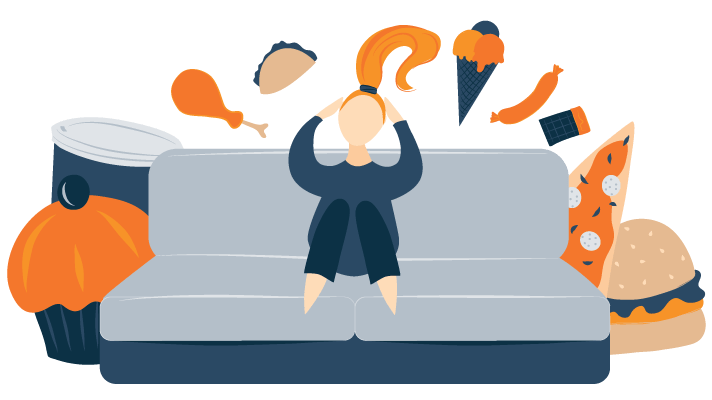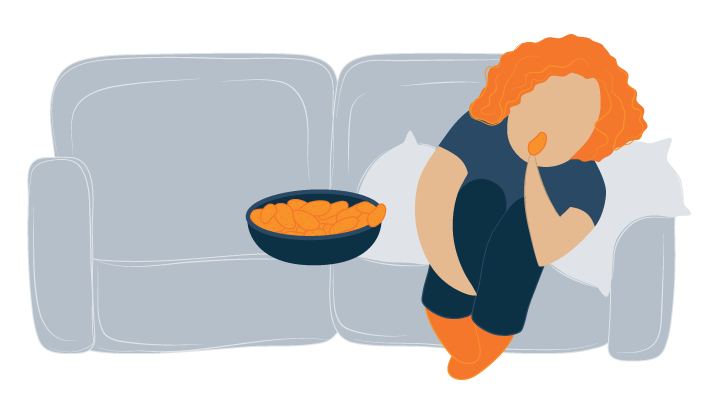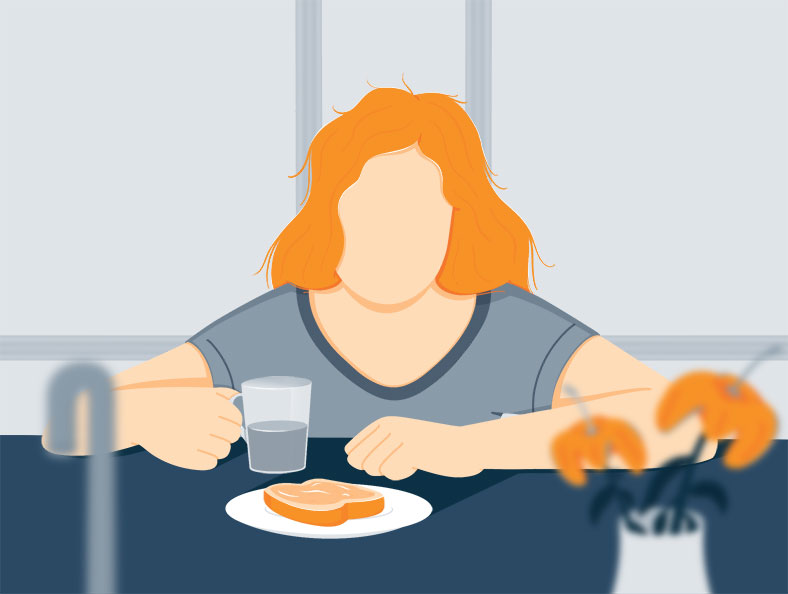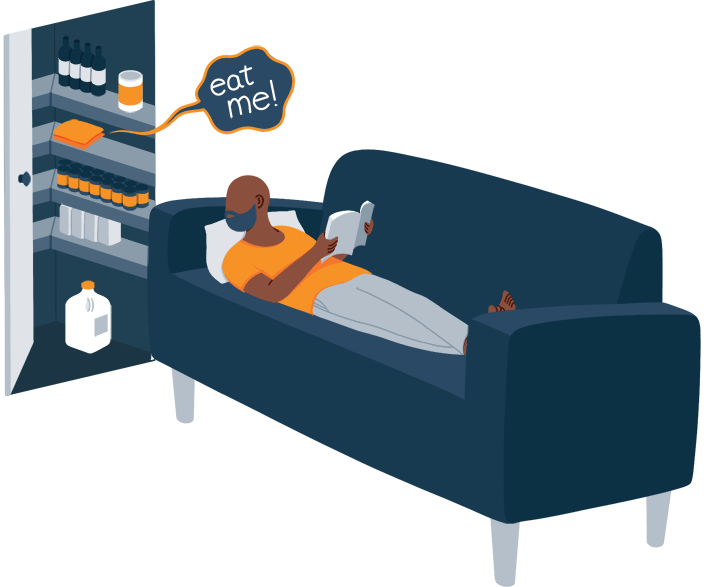Our culture places considerable pressure on the way we look, which may mean we diet, fast, or even go to bed hungry to fulfill these silent expectations. So while going to bed hungry isn’t necessarily bad on occasion, it’s critical to consider how often this occurs and if it’s a result of depriving yourself of essential nutrients.
Some research suggests that going to bed with hunger pains might do more harm than good. In this article, we explore when it’s okay to sleep hungry, share our most helpful tips to avoid nighttime hunger, and when the sensation may indicate a more extensive root issue.
Why You’re Hungry at Night
Lack of Sleep
Getting enough sleep may be critical to maintaining body weight and a healthy metabolism. Studies show an association between shorter sleep duration and an increase in body mass index. In one study, participants with short sleep habits underwent nighttime polysomnography and were evaluated in the morning.
Researchers found that the participants’ leptin and ghrelin were considerably lower than the day before, and it’s been reported that leptin and ghrelin affect appetite levels.[1] These findings may also explain why people feel hungrier than usual when enduring a hangover, the day after consuming excessive alcoholic beverages, as sleep is often impaired as a result.
Further, some experts claim obesity is more prevalent in some western societies where sleep is less valued, yet food is readily available.
Calorie Restriction
Minimizing caloric intake is a common strategy for weight control. However, opting for foods with fewer calories sometimes means we choose foods with fewer nutrients as well. Ensuring you’re fueling yourself with a well-balanced diet rich in vitamins and nutrients should help you feel full and more energized for longer periods. You want to go to bed satiated rather than listening to your stomach grumble.
Want to learn more? Check out our Weight and Sleep Guide.
Not Eating Regularly
While intermittent fasting has caught on quickly among those looking to cut weight, regular eating is essential for our well-being. Keeping healthy snacks handy and sitting down to meals following a schedule is essential for our stomachs and helps regulate our circadian rhythm. Plus, following a regular meal schedule may help you feel more satiated before going to bed.
Restricting your eating may bring weight loss, but you don’t want it to be detrimental to your health and happiness.
Malnutrition
Even if you’re regularly eating, you may not be consuming the appropriate amount of nutrients to feel satiated and energized. Many cultures are replete with readily available foods full of empty calories that don’t leave us feeling our best. Eating a large unhealthy meal a few hours before bed may leave you hungry for more when you lay down to sleep.[2]
Our families greatly influence how we consume foods. Parents with children who complain of being hungry before bed may be feeding their children plenty of food, leaving parents scaratching their heads as to how their child can eat so much. However, if the foods they’re eating aren’t rich in protein, complex carbs, minerals, and vitamins, they may still become hungry soon after, ultimately keeping you up at night feeding them a second dinner.
Effects of Going to Bed Hungry
Weight Gain
Have you ever skipped breakfast and found yourself desperately trying to resist the urge to devour the pizza and donuts in the break room? Depriving yourself of food may make it more difficult to exercise good judgment in your food choices.
By regularly going to bed hungry you may be depriving yourself of food to the point where the cookies on the counter sound like a logical breakfast choice. Choosing healthy foods should help keep you feeling fuller for longer and allow you to make more nutritious decisions at mealtime, helping you feel satisfied for more extended periods.
If you find yourself looking for a new mattress, check out our Best Mattresses of 2024 to find beds recommended by our sleep experts for your needs.
Lose Muscle Mass
Even though our body’s metabolic processes slow down when we’re asleep, they’re still functioning. As we enter deep sleep, our body goes into full repair and restoration mode, this includes building muscle mass, converting protein to muscle, and repairing damaged tissues.[3]
When we haven’t provided our bodies with enough fuel to do their jobs, we risk losing muscle mass while we sleep.
Less Energy
Our body is working all the time and therefore burns calories 24 hours a day, even when we’re asleep. While that doesn’t mean we should eat constantly, it does mean that we need to provide our system with enough fuel to carry out its normal duties like walking, talking, working, socializing, exercising, and more.
While we’re asleep, we’re still performing numerous bodily functions, all requiring energy. Without some store of food-based energy to facilitate these processes, we run the risk of waking up still feeling tired.[4]
By eating a light snack with high levels of protein or fiber in the hours before bed, you’ll wake up feeling more refreshed and energized than if you had sustained. A study by Florida State University’s Department of Nutrition found that in some people, a light pre-bedtime snack may improve energy and boost metabolism.
Mood
No one likes being “hangry,” that scary combination of hungry and angry, but by starving yourself before bed, you’re opening up the door for an unhappy episode that can have detrimental effects on your well-being, career, or relationships.
The scientific explanation for the effect that not eating has on mood has to do with fluctuating serotonin levels. When you go extended periods without eating, the resulting drop can make you extra grumpy. You may believe coffee is what you need in your afternoon slump, however, you may just need a snack.[5]
Low Blood Sugar
Eating a balanced diet, which includes regular meals, keeps blood sugar at normal levels. However, by going to bed on an empty stomach, your blood sugar level may drop, also referred to as hypoglycemia. The condition can be dangerous for people with diabetes and other critical health issues.[6]
Even in healthy folks, low blood sugar levels can cause headaches and dizziness and negatively affect sleep.
Lack of Sleep
Low insulin levels may negatively influence sleep as it often affects the levels of our hormones, ghrelin and leptin. Sleep deprivation can cause you to struggle to sleep at night, and overtiredness has been shown to trigger hunger. Be sure you’re prioritizing a nightly bedtime routine and keeping a regular sleep schedule to keep positive sleep hygiene.[7]
How to Avoid Hunger at Night
Don’t Skip Meals
Try making sure you space your meals out throughout the day and don’t be afraid to snack. This way, you keep your insulin levels stable and avoid nocturnal cravings to binge. Eating nutritious food regularly is completely fine for our mood, weight, and energy.
Fueling yourself is critical not only for your health but your happiness.
Eat Food Rich in Nutrients
A medium-sized dinner at a reasonable hour, rich in nutrients, should help you avoid hunger. Ideally, you’ll be consuming foods full of vitamins and minerals throughout the day. To prevent nighttime hunger, opt for a dinner containing lean proteins, healthy carbohydrates, and nutrient-rich vegetables to keep you fuller longer.
Those who are vegan or vegetarian and avoid eating animal protein can opt for meals including nuts, protein-dense vegetables, and healthy fats like avocado to keep metabolic processes on track.
Eat Solid Snacks
Snacks packed with real nutrients over chips or crisps should help fill you up and keep you fuller longer. If you’ve already had dinner but still feel a void, grab a handful of nuts, pour a glass of oat milk, or even a few strips of sandwich meat.
It might be tempting to consume something sweet like chocolate, but keep in mind avoiding caffeine before bed is wise so you can fall asleep without delay and throughout the night.
Read More: Healthy Late-Night Snacks
Frequently Asked Questions
Is it safe to sleep on a full stomach?
While we don’t recommend sleeping on an empty stomach, we suggest you avoid sleeping on an overly full stomach as well. Sleeping with a bloated belly can harm your insulin levels, which spikes your blood sugar and can lead to weight gain. While this shouldn’t cause life-threatening consequences, it’s important to remember that obesity puts you at risk for other dangerous conditions in the long term.
Learn More: Risks of Eating Just Before Bed
Can sleeping hungry help you lose weight?
Restricting calories is a common strategy to lose weight; however, doing so could make your stomach rumble at night, keeping you awake. Further, sleep deprivation triggers hormones that affect hunger, potentially making you more hungry. In addition, total caloric intake typically matters more than anything else when it comes to weight control, regardless of when your meals are consumed.
Instead of deciding to go back to sleep and starve, make a concerted effort to regulate mealtime, so you eat plenty during the day and have a healthy dinner that’s not too heavy yet still has a significant source of rich nutrients.
Sources and References:
- [1] “Determining the Relationship between Hunger at Bedtime and Sleep in a Large Population: Science to Empower Healthy Diet and Body Composition”, University of California
- [2] Frank A J L Scheer, et al.“The Internal Circadian Clock Increases Hunger and Appetite in the Evening Independent of Food Intake and Other Behaviors”, U.S. National Library of Medicine, March, 2013
- [3] Mike Samuels, “Eating before Bed to Lose Weight and Gain Muscle”, Healthy Eating | SF Gate, December 27, 2018
- [4] Shahrad Taheri, et al., “Short Sleep Duration Is Associated with Reduced Leptin, Elevated Ghrelin, and Increased Body Mass Index”, LoS Medicine, Public Library of Science, December, 2004
- [5] “Get Hungry When Angry? Blame Low Serotonin”, Social Cognitive Neuroscience Laboratory
- [6] “Hypoglycemia”, NHS Choices
- [7] “Toxic Food Environment”, Obesity Prevention Source, July 1, 2020

Rachael Gilpin
Content Writer
About Author
Rachael is a content writer for Sleep Advisor who loves combining her enthusiasm for writing and wellness.
Back Sleeper







